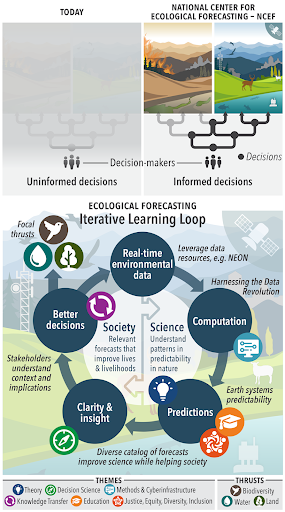Prototyping a Distributed, Asynchronous Workflow for Iterative Near-Term Ecological Forecasting
Abstract
The ongoing data revolution has begun to fuel the growth of near-term iterative ecological forecasts: continually-updated predictions about the future state (daily to multi-year) of ecosystems and their services that allow society to anticipate environmental challenges and improve decisions on actionable timescales, while allowing researchers to accelerate scientific discovery and answer fundamental research questions about the predictability of nature.
To fuel the growth of the ecological forecasting community, there is a need to openly develop and deploy accessible, reusable, and scalable community cyberinfrastructure (CI) that can be broadly applied to make large numbers of ecological forecasts on a repeatable, frequent basis.
This RHC project will prototype the beginnings of such a system, focusing on developing a cloud-native workflow that can handle an asynchronous, event-driven, and distributed approach to execution.
- Task 1 is to work with the ecological forecasting community to develop a high-level system design of a core Cyber-Infrastructure (CI) stack that will enable rapid platform-agnostic deployment and that can be scaled across distributed high-performance and cloud infrastructures.
- Task 2 is to deploy this stack on the Massachusetts Open Cloud Alliance.
- Task 3 is to deploy a minimal example of the PEcAn terrestrial carbon cycle forecasting workflow (e.g., one site for one model using only one driver and one data constraint) within this stack.
- Task 4 will focus on the development and deployment of an asynchronous, event-driven scheduler that will elastically launch data ingest containers, which will enable scaling our prototype to multiple sites, more data constraints, and a collection of models.
Future applications would focus on extending this system to additional ecological forecast workflows (e.g., water resources, biodiversity, zoonotic disease, forest pests and other invasive species).
Links to external project pages, github repositories
Presentations
Synergistic funding sources
- NASA Carbon Monitoring System (2021-2024): Multisensor data assimilation to support terrestrial carbon cycle and disturbance Monitoring, Reporting, Verification, and Forecasting
- NEON RCN: The Ecological Forecasting Initiative RCN: Using NEON-enabled near-term forecasting to synthesize our understanding of predictability across ecological systems and scales

